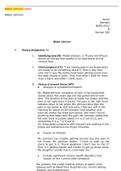Table of Contents
1. The Kaiserreich: 1871-1914
How successful was Bismark in preserving his political authority in the years 1871 to
1890?
Kaiser Willhelm II successfully maintained his political authority in the years 1890 to 1914
How significant was the role played by political parties in influencing government policy in
the years 1871 to 1890?
The social structure of Germany changed little in the years 1871 to 1914
There was consistent economic growth in industry and agriculture in the years 1871 to
1890
2. Empire to democracy: 1914-29
Nationalism posed a far greater threat to Germany than communism in the period
1890-1924
German society in 1929 was little different from what it had been in 1914
To what extent was the German economy stronger at the beginning of 1929 than it had
been in 1900?
By 1929, Germany was more politically stable than it had been at any time since 1890
The influence of the military undermined the political stability of Germany in the years
1890 to 1929
3. The Nazi Experiment: 1929-49
The development and success of the Nazis in the years 1920 to 1941 was due to Hitler’s
leadership
The governments of Germany dealt effectively with the economic challenges they faced
in the years 1923 to 1945
Nazism did more to destroy than to build a politically strong and stable Germany
Political change in Germany, in the years 1919 to 1949, was driven by economic factors
The lives of working-class Germans improved through the years 1918 to 1939
, 1. The Kaiserreich: 1871-1914
How successful was Bismark in preserving his political authority in the years 1871 to
1890?
Para 1: Authority to complete his goals of suppressing the SPD
- Successful in keeping the Social Democratic Party non-revolutionary and by delaying
their power.
- Anti socialist laws: the first of which was passed on 19 October 1878
- Although the law did not ban the SPD directly, it aimed to cripple the
organisation through various means. The banning of any group or
meeting of whose aims were to spread social-democratic principles,
the outlawing of trade unions and the closing of 45 newspapers are
examples of suppression.
- This is proven by the fact that the Social Democratic Party grew substantially
when Bismark lost power, getting the highest votes in the 1924 elections with
20.5%, suggesting that his rule and laws against the party were stopping
them from gaining as much support as they could have received.
- Despite this, Bismarck was unsuccessful in actually squashing their momentum and
support
- In the time of his rule the Social Democratic Party still gained 16.6 seats in
the Reichstag between 1871 and 1890.
- The SPD circumvented the anti socialist measures by having its candidates
run as ostensible independents, relocating publications outside of Germany
and spreading Social Democratic views as verbatim publications of Reichstag
speeches which were privileged speech with regard to censorship
- Overall, social democracy emerged stronger from the conflict. In the first
Reichstag elections after the end of the Socialist Act on June 15, 1893, the
Social Democratic Party received more votes than ever before (23.4%)
- Bismark was forced to implement social welfare reforms
- State Socialism (German: Staatssozialismus) was a set of social programmes
implemented in the German Empire that were initiated by Otto von Bismarck
in 1883 as remedial measures to appease the working class and detract
support for socialism
- Tariffs so appease the national liberals also pushed more to socialism
Judgement: In general, Bismarck did not effectively preserve his political authority in keeping
socialism down as his anti-socialist laws only worked in weakening the Social Democratic
Party for a short time with no lasting effects.
Para 2: Authority to have political freedom despite the Kaiser's power (1 and 2)
- Willhelm 1=
- Bismark did not use a cabinet system and if Reichstag deputies criticised him
he sought the kaiser's permission to dissolve the Reichstag and call an
election to increase his support (this happened in the 1878 election)
- Willhelm 1 relied on Bismarck to rule and gave him significant independence
- Had a good personal relationship with trust
, - Constitutionally the Kaiser still had the final say: had control of all armed
forces and controlled all appointments to the executive and civil service
- Willhelm 2=
- Bismark lost significant authority and was eventually kicked out in 1890
- They were at odds with the view of maintaining the Reinsurance Treaty with
Russia which Bismarck orchestrated under Wilhelm I and in addition they also
disagreed over social policy.
Judgement: Ultimately his limited success was due to his personal relationships with
Wilhelm I which was evidently proved when his political authority could not survive a change
in Kaiser
Para 3: Authority to maintain control over the Reichstag and it’s legislation
- From 1871 to 1878 Bismarck worked with the national liberals, who had a 125
majority in the Reichstag at that current time.
- Bismarck used his undeniable power to utilise the national liberals eagerness
to help him consolidate national unity.
- As this successful alliance enabled multitudinous useful legislation in the early
1870s such as a national system of currency that was introduced, the
Reichsbank was created, tariffs were abolished and there was much legal
standardisation.
- Furthermore, with the national liberals support they became united against
the Catholics and were able to push through with kulturkampf.
- Failure because the party gained votes despite suppression
- 63 seats in 1871
- 106 seats in 1890
- Following Bismarck's 1879 turn from free trade to protectionism and
from the National Liberal party to the Conservative parties, he also
abandoned the unsuccessful Kulturkampf
- When the National liberals deteriorated, Bismarck allied with the conservatives and
the centre parties in 1879. He was then able to secure economic protectionism by the
passing of the Tariff act of 1879.
- Arguably consolidated the work of unification by drawing the south and north
Germany closer together and accelerated the growth of a large internal
market.
- Which illustrates Bismark's ability to transfigure his skills as a politician to
continue to uphold and strengthen his power and political control. Bismark
could evidently adapt to different parties in order to push through desired
legislation
- However his need to create alliances shows that he was largely powerless without
the support of popular reichstag parties and the king. He managed to maintain some
authority in the Reichstag but had to compromise from his main goals.
- Bismarck's arguable control over the reichstag resulted in some legislation wins for
him but overall were partially unsuccessful for example kulturkampf and anti socialist
laws



